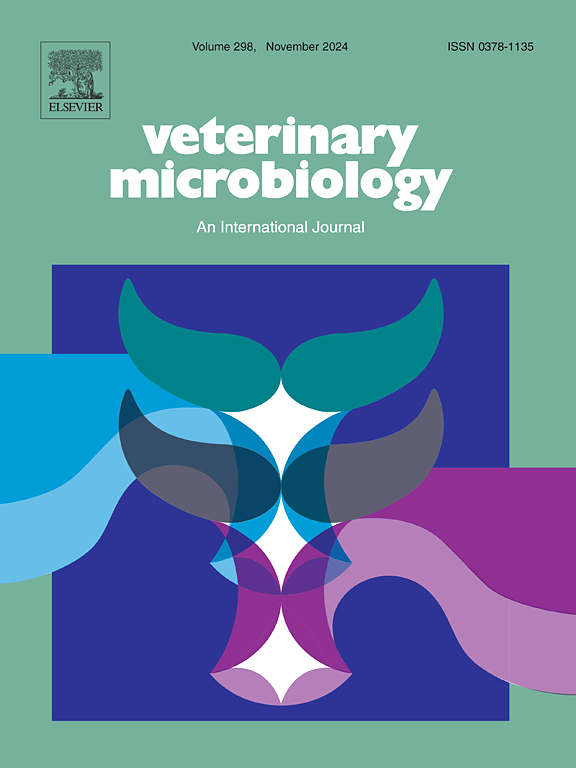Signal peptides enhance immunogenicity and protection of recombinant Salmonella enterica serovar Choleraesuis vectors against Streptococcus suis
IF 2.7
2区 农林科学
Q3 MICROBIOLOGY
引用次数: 0
Abstract
Streptococcus suis (S. suis) is prevalent worldwide, threatening the pig farming industry and public health. At present, there is no effective vaccine. Salmonella vectors are highly attractive vaccine platforms that can deliver foreign antigens to induce protective responses. However, the limited secretion and release of foreign antigens limit the immunogenicity. Here, we employed 6-phosphogluconate dehydrogenase (6PGD), a protective antigen of Streptococcus suis serotype 2 (SS2), as a model antigen to evaluate how signal peptide (SP) selection influences antigen expression dynamics and immunogenicity in Salmonella vectors. Three heterologous SP fusion constructs, PelB-6PGD (P-6PGD), DsbA-6PGD (D-6PGD), and Bla/ss-6PGD (B-6PGD), were subjected to comparative analysis of expression efficiency, subcellular localization, and subsequent immune responses. While cytoplasmic expression levels showed no significant differences among constructs, recombinant Salmonella enterica serovar Choleraesuis (S. Choleraesuis) strain rSC0016(pS-P-6PGD) carrying PelB-6PGD exhibited significantly enhanced periplasmic accumulation and superior extracellular secretion efficiency in culture supernatants. The strong ability of PelB SP to secrete proteins leads to better uptake of the foreign antigen by bone marrow-derived dendritic cells (BMDCs). After the strong antigen-specific humoral, cellular, and mucosal immunity induced was characterized, rSC0016(pS-P-6PGD)-immunized mice achieved significantly superior protection than rSC0016(pS-B-6PGD) and rSC0016(pS-D-6PGD) groups. Histopathological assessments further corroborated these findings, revealing minimal SS2-induced lesions in the lungs and brains of rSC0016(pS-P-6PGD)-immunized mice. Collectively, these findings establish PelB as an excellent SP for enhancing extracellular antigen secretion in Salmonella vectors, thereby amplifying both humoral and cellular immunity critical for defense against invasive bacterial pathogens such as SS2. This study provides a strategic framework for optimizing antigen delivery in live-vectored vaccine development.
信号肽增强重组肠沙门氏菌血清型霍乱病媒对猪链球菌的免疫原性和保护作用
猪链球菌(S. suis)在世界范围内流行,威胁着养猪业和公众健康。目前还没有有效的疫苗。沙门氏菌载体是极具吸引力的疫苗平台,可以传递外源抗原以诱导保护性反应。然而,外源抗原的分泌和释放有限,限制了免疫原性。本研究以猪链球菌血清2型(SS2)的保护性抗原- 6-磷酸葡萄糖酸脱氢酶(6PGD)为模型抗原,研究信号肽(SP)选择对沙门氏菌载体中抗原表达动态和免疫原性的影响。对PelB-6PGD (P-6PGD)、DsbA-6PGD (D-6PGD)和Bla/ss-6PGD (B-6PGD)三种异种SP融合构建体的表达效率、亚细胞定位和随后的免疫反应进行比较分析。虽然不同构建体的细胞质表达水平无显著差异,但携带PelB-6PGD的重组肠沙门氏菌血清型霍乱沙门氏菌(S. Choleraesuis)菌株rSC0016(pS-P-6PGD)在培养上清液中表现出明显增强的质周积累和优异的细胞外分泌效率。PelB SP分泌蛋白质的强大能力导致骨髓源性树突状细胞(bmdc)更好地吸收外来抗原。在对诱导的强抗原特异性体液、细胞和粘膜免疫进行表征后,rSC0016(pS-P-6PGD)免疫小鼠的保护效果明显优于rSC0016(pS-B-6PGD)和rSC0016(pS-D-6PGD)组。组织病理学评估进一步证实了这些发现,显示在rSC0016(pS-P-6PGD)免疫小鼠的肺和脑中有最小的ss2诱导的病变。总之,这些发现表明PelB是一种很好的SP,可以增强沙门氏菌载体的细胞外抗原分泌,从而增强对入侵性细菌病原体(如SS2)的防御至关重要的体液和细胞免疫。本研究为优化活载体疫苗开发过程中的抗原递送提供了一个战略框架。
本文章由计算机程序翻译,如有差异,请以英文原文为准。
求助全文
约1分钟内获得全文
求助全文
来源期刊

Veterinary microbiology
农林科学-兽医学
CiteScore
5.90
自引率
6.10%
发文量
221
审稿时长
52 days
期刊介绍:
Veterinary Microbiology is concerned with microbial (bacterial, fungal, viral) diseases of domesticated vertebrate animals (livestock, companion animals, fur-bearing animals, game, poultry, fish) that supply food, other useful products or companionship. In addition, Microbial diseases of wild animals living in captivity, or as members of the feral fauna will also be considered if the infections are of interest because of their interrelation with humans (zoonoses) and/or domestic animals. Studies of antimicrobial resistance are also included, provided that the results represent a substantial advance in knowledge. Authors are strongly encouraged to read - prior to submission - the Editorials (''Scope or cope'' and ''Scope or cope II'') published previously in the journal. The Editors reserve the right to suggest submission to another journal for those papers which they feel would be more appropriate for consideration by that journal.
Original research papers of high quality and novelty on aspects of control, host response, molecular biology, pathogenesis, prevention, and treatment of microbial diseases of animals are published. Papers dealing primarily with immunology, epidemiology, molecular biology and antiviral or microbial agents will only be considered if they demonstrate a clear impact on a disease. Papers focusing solely on diagnostic techniques (such as another PCR protocol or ELISA) will not be published - focus should be on a microorganism and not on a particular technique. Papers only reporting microbial sequences, transcriptomics data, or proteomics data will not be considered unless the results represent a substantial advance in knowledge.
Drug trial papers will be considered if they have general application or significance. Papers on the identification of microorganisms will also be considered, but detailed taxonomic studies do not fall within the scope of the journal. Case reports will not be published, unless they have general application or contain novel aspects. Papers of geographically limited interest, which repeat what had been established elsewhere will not be considered. The readership of the journal is global.
 求助内容:
求助内容: 应助结果提醒方式:
应助结果提醒方式:


